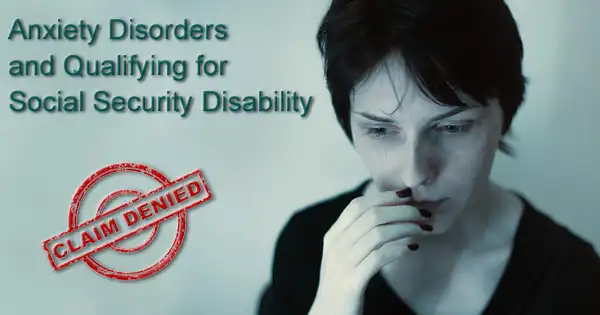Anxiety Disorders and qualifying for Social Security Disability Insurance
Author: Attorney Lloyd Bemis
Updated: 5/15/2025
Can I get disability benefits if I am suffering from the effects of an Anxiety Disorder?
First you must meet the SSA’s financial requirement:
You must have worked long enough, recently enough, and not made over a predetermined level of income.
Second you must meet the medical requirements:
Social Security recognizes four different anxiety disorders as impairments:
- Generalized anxiety disorder
- Panic disorder
- Social Anxiety Disorder
- Obsessive-Compulsive Disorder
To qualify for disability benefits due to an anxiety disorder, applicants must demonstrate the presence of the disorder through at least three specific symptoms, which include restlessness, difficulty concentrating, sleep disturbances, and fatigue. Additionally, applicants must exhibit an “extreme” limitation in one area and a “marked” limitation in two other areas related to cognitive and social functioning.
The SSA will evaluate evidence from healthcare providers including information from family and colleagues who can attest to the applicant’s daily interactions and challenges. Applicants should be prepared to submit comprehensive documentation.
Qualifying for Disability Benefits with Anxiety Disorders: A Comprehensive Guide
Living with an anxiety disorder can be profoundly challenging, affecting your ability to work, maintain relationships, and perform everyday tasks.
When anxiety symptoms become severe enough to prevent you from working, disability benefits may provide crucial financial support. This guide explores the process of qualifying for Social Security disability benefits with an anxiety disorder, outlining eligibility requirements, application procedures, and important considerations.
Table of Contents:
1. What are the Functional Challenges Related to Anxiety Disorders?
Anxiety disorders can manifest in numerous ways that significantly impair daily functioning. These functional challenges often include:
- Concentration and Focus Issues: Persistent worry, racing thoughts, and mental fatigue can make it difficult to concentrate on tasks, follow instructions, or complete assignments in a timely manner.
- Social Functioning Impairments: Social anxiety, panic attacks, or intense fear of judgment can severely limit your ability to interact with coworkers, supervisors, or customers—essential components of most jobs.
- Adaptability Challenges: Many individuals with anxiety disorders struggle with adjusting to changes in routine, workplace environment, or job responsibilities, causing extreme distress when faced with new situations.
- Attendance Problems: Anxiety-related symptoms like panic attacks, agoraphobia, or physical manifestations (headaches, stomach issues, fatigue) often lead to frequent absences, tardiness, or leaving work early.
- Executive Function Difficulties: Decision-making, problem-solving, and organizational abilities may be compromised by overwhelming anxiety and worry.
- Physical Limitations: Chronic anxiety frequently produces physical symptoms such as insomnia, fatigue, muscle tension, headaches, and digestive issues that further impair work capacity.
These functional challenges can create substantial barriers to maintaining full-time employment, potentially qualifying affected individuals for disability benefits.
2. Are Anxiety Disorders Listed as an Impairment in the Social Security Administration’s Blue Book?
Yes, anxiety disorders are recognized as potentially disabling conditions in the Social Security Administration’s (SSA) “Blue Book” of impairment listings. They are specifically addressed under Section 12.06: Anxiety and Obsessive-Compulsive Disorders in the Mental Disorders category.
This listing encompasses various anxiety-related conditions, including:
- Generalized anxiety disorder
- Panic disorder
- Social anxiety disorder
- Agoraphobia
- Obsessive-compulsive disorder
- Post-traumatic stress disorder (which has its own listing under 12.15)
The inclusion of anxiety disorders in the Blue Book acknowledges that these conditions can be sufficiently severe to prevent substantial gainful activity and warrant disability benefits.
3. What are the Medical Requirements in the SSA’s Blue Book to Qualify for Social Security Disability for Anxiety Disorders?
To meet the SSA’s medical criteria for anxiety disorders under Listing 12.06, you must demonstrate both:
1. Medical documentation of three or more of the following:
- Restlessness
- Easily fatigued
- Difficulty concentrating
- Irritability
- Muscle tension
- Sleep disturbance
AND
2. Extreme limitation of one, or marked limitation of two, of the following areas of mental functioning:
- Understanding, remembering, or applying information
- Interacting with others
- Concentrating, persisting, or maintaining pace
- Adapting or managing oneself
Alternatively, you can qualify by proving your anxiety disorder is “serious and persistent,” meaning you have a documented history of the disorder over at least 2 years, and evidence of both:
- Medical treatment, mental health therapy, psychosocial support, or a highly structured setting that diminishes the symptoms and signs of your mental disorder
- Minimal capacity to adapt to changes in your environment or to demands that are not already part of your daily life
These criteria must be supported by comprehensive medical evidence from acceptable medical sources, including detailed treatment notes, psychological evaluations, and possibly statements from mental health professionals documenting the severity and functional impact of your condition.
4. What if I Don’t Meet the Disability Benefit Requirements of Social Security’s Listing for an Anxiety Disorder?
If your anxiety disorder doesn’t precisely meet the criteria specified in Listing 12.06, you may still qualify for disability benefits through a process called a “medical-vocational allowance.”
This approach considers your:
1. Residual Functional Capacity (RFC): The SSA will assess what you can still do despite your anxiety-related limitations. For mental impairments like anxiety disorders, this evaluation focuses on your ability to handle workplace requirements such as:
- Following instructions
- Maintaining concentration
- Interacting appropriately with others
- Adapting to changes
- Managing stress
- Maintaining regular attendance
2. Age, Education, and Work Experience: The SSA applies what are known as “grid rules” to determine if you can reasonably transition to other types of work based on these factors.
3. Transferable Skills: The SSA considers whether you have skills from your past work that could transfer to other jobs within your current functional capacity.
To strengthen an RFC-based claim for anxiety disorders, provide detailed documentation of how your symptoms affect your daily functioning, particularly in work-like settings.
Statements from former employers, coworkers, or family members describing observed limitations can be valuable supplements to medical evidence.
Residual Functioning Capacity –>
5. What Happens if I Have Additional Ailments as Well as an Anxiety Disorder?
Many individuals with anxiety disorders also experience comorbid conditions, such as depression, chronic pain, autoimmune disorders, or other physical and mental health issues. When applying for disability benefits with multiple conditions, the SSA must consider the combined effect of all your impairments on your ability to work.
This approach of considering the “combined effects” of multiple impairments, can significantly strengthen your disability claim, even if no single condition would qualify you on its own.
For example, moderate anxiety paired with moderate depression and chronic back pain might collectively prevent you from sustaining employment, even though each condition independently might not meet a listing.
To effectively present multiple conditions:
- Ensure all diagnoses are clearly documented by appropriate medical professionals
- Gather evidence showing how your conditions interact and exacerbate each other
- Explain how the combined symptoms affect your functioning in ways that single condition evaluations might miss
- Consider obtaining a comprehensive medical opinion that addresses the cumulative impact of all your conditions
The SSA is legally required to consider the combined effect of multiple impairments throughout the evaluation process.
Disability for Multiple Impairments –>
6. What are the Basic Financial Requirements for Qualifying for Social Security Disability Benefits for an Anxiety Disorder?
You will need to meet the financial requirements established by the Social Security Administration to qualify for disability assistance.
They require:
- Requires sufficient “work credits” earned through your employment history
- In 2025, you earn one work credit for each $1,810 in wages or self-employment income
- You can earn up to four credits per year
- Most adults need 40 credits, with 20 earned in the last 10 years before disability onset
- Younger workers may qualify with fewer credits
- Cannot engage in Substantial Gainful Activity (SGA), defined in 2025 as earning more than $1,620 monthly for non-blind individuals or $2,700 for blind individuals
In order to qualify, your disability must be expected to last at least 12 months or result in death, and you must be unable to engage in substantial gainful activity.
If you cannot meet the financial requirements, you will be denied SSDI benefits.
SSDI Financial Requirements –>
7. If I am Denied, What is the Appeal Process for Disability Benefits?
Do not be discouraged if you receive a denial letter after applying for benefits, the majority of initial disability applications are denied, making understanding the appeal process essential.
The SSA’s four-level appeal process includes:
1. Reconsideration: This first-level appeal must be filed within 60 days of receiving your denial notice. During reconsideration:
- A different disability examiner reviews your case
- You can submit new medical evidence
- Approximately 15% of reconsideration appeals are approved
2. Administrative Law Judge (ALJ) Hearing: If reconsideration is denied, you have 60 days to request a hearing before an ALJ. This crucial stage offers:
- An opportunity to present your case in person
- The chance to provide testimony about your condition and limitations
- The ability to bring witnesses (such as family members or former employers)
- The highest approval rates in the appeals process (approximately 50%)
You should seriously consider representation at this point in the process.
3. Appeals Council Review: If the ALJ denies your claim, you can request a review by the SSA Appeals Council, which:
- Reviews the ALJ’s decision for legal errors
- May approve, deny, or return your case to the ALJ for reconsideration
- Has relatively low approval rates
4. Federal Court Review: The final level of appeal involves filing a lawsuit in U.S. District Court:
- Requires filing within 60 days of Appeals Council denial
- Typically requires attorney representation
- Focuses on legal issues rather than medical evidence
- May result in benefits approval or remand to the SSA for reconsideration
Each level of appeal has strict deadlines, specific procedures, and distinct considerations. Missing deadlines typically means starting the entire application process over again.
“Once Social Security determines the limitations caused by your condition, they will employ a vocational expert to assess whether a person with these limitations is employable. Most vocational experts will find a person to be unemployable if their condition or the treatment rendered for the condition causes the person to regularly be absent two or more days a month or be “off-task” 15% or more of the workday.”
8. What Will Happen at My Appeal Hearing and How Are They Held?
The ALJ hearing is typically the most important stage in the appeals process.
In 2025, these hearings continue to be held in three primary formats:
- In-Person Hearings: Conducted at an Office of Hearings Operations (OHO) location with you, your representative, the judge, and any witnesses physically present.
- Video Hearings: Conducted via secure video conferencing, allowing you to attend from a location closer to your home while the judge may be elsewhere.
- Telephone Hearings: Became more common during the COVID-19 pandemic and remain an option, especially for those with mobility limitations or transportation barriers.
Regardless of format, a typical hearing follows this structure:
- Medical conditions and symptoms
- Daily activities and limitations
- Work history and education
- Treatments and medications
- How your anxiety affects your ability to function
- Evaluates your past work and classifies it according to skill level and exertion
- Responds to hypothetical questions from the ALJ about what jobs a person with specific limitations could perform
- Provides information about job availability in the national economy
- May be cross-examined by your representative
1. Opening Statements: The ALJ explains the purpose of the hearing and the issues under consideration.
2. Claimant Testimony: You’ll be asked questions about your:
3. Witness Testimony: Family members or caregivers may testify about their observations of your limitations.
4. Medical Expert Testimony: In some cases, the ALJ may have a medical expert review your file and provide opinions on your condition’s severity and limitations.
5. Vocational Expert (VE) Testimony: Almost all hearings include testimony from a VE, who:
The VE’s testimony is often crucial, as disability is ultimately determined by whether jobs exist that you can perform despite your limitations.
Your representative will typically challenge the VE’s conclusions by presenting hypotheticals that more accurately reflect your full range of limitations, particularly those stemming from anxiety
.
Hearings usually last 45-60 minutes, with a decision typically issued in writing several weeks afterward.
Preparing for a Disability Hearing –>
9. The Essential Role of a Disability Attorney at Your Hearing
Having professional representation at your disability hearing significantly increases your chances of approval.
A disability attorney or advocate provides valuable services:
Case Preparation:
- Analyzing your medical records to identify strengths and weaknesses
- Obtaining additional medical evidence to support your claim
- Developing legal theories specific to anxiety disorders
- Preparing you for questions you’ll face during the hearing
Strategic Representation:
- Effectively questioning the vocational expert
- Highlighting aspects of your condition that meet listing requirements
- Crafting hypotheticals that accurately reflect your anxiety-related limitations
- Making compelling arguments about why your anxiety prevents substantial gainful activity
Fee Structure:
- Disability attorneys work on contingency, meaning they only get paid if you win
- Fees are capped at 25% of your past-due benefits or $9,200, whichever is less
- These fees are directly regulated and approved by the SSA
- No upfront costs are required
- If you don’t win, you typically don’t pay attorney fees (though you may be responsible for small costs like medical record retrieval fees)
The financial arrangement makes legal representation accessible regardless of your current financial situation. Given the complexity of disability law and the significantly higher approval rates for represented claimants (approximately 60% with representation versus 20% without), professional assistance is often a wise investment.
10. What if I am Over the Age of 50? Is it Easier to Qualify?
Yes, the SSA acknowledges that workers over 50 face greater challenges in transitioning to new types of work. Through what are known as the “Medical-Vocational Guidelines” or “Grid Rules,” the SSA applies progressively more lenient standards as applicants age.
For individuals with anxiety disorders:
- Ages 50-54: You may qualify as disabled if your anxiety limits you to sedentary work and you lack transferable skills or education for such work.
- Ages 55-59: You may qualify if your anxiety limits you to light work and you lack transferable skills or relevant education.
- Ages 60+: Even more relaxed standards apply, requiring very little adaptation to different types of work.
These age-related considerations are particularly relevant for anxiety disorders because:
- Older workers often struggle more with adapting to new work environments
- Learning new skills can be more challenging when compounded by anxiety
- The combination of physical limitations that come with age and anxiety-related mental limitations creates significant barriers to employment
If you’re over 50, make sure your disability application emphasizes:
- Your age
- Your work history, particularly skill level
- Your educational background
- How your anxiety affects your ability to adapt to new work settings
Disability for those over 50 –>
11. What if I Don’t Qualify for SSDI? Can I Qualify for SSI?
If you lack sufficient work credits for SSDI but have limited income and resources, Supplemental Security Income (SSI) provides an alternative path to disability benefits.
To qualify for SSI with an anxiety disorder, you must:
- Meet the same medical criteria as for SSDI (either meeting Listing 12.06 or qualifying through an RFC assessment)
- Meet strict financial eligibility requirements:
- Limited income below the Federal Benefit Rate plus applicable state supplements
- Resources (assets) below $2,000 for individuals or $3,000 for couples
- Certain assets are excluded, including your home, one vehicle, and household goods
- Be a U.S. citizen or qualified alien
- Not be receiving other substantial support
SSI benefits for approved applicants include:
- Monthly cash payments (lower than typical SSDI benefits)
- Automatic Medicaid eligibility in most states
- Potential eligibility for food assistance and housing subsidies
The application process and medical evaluation for SSI are essentially identical to SSDI, with the primary difference being financial eligibility requirements rather than work history.
12. What if I Have a Long-Term Disability Policy?
Private long-term disability (LTD) insurance policies operate independently from Social Security disability programs and often provide additional benefits for anxiety disorders, sometimes with less stringent qualification criteria.
If you have an LTD policy through your employer or purchased privately, consider:
1. Different Definition of Disability: Many LTD policies use an “own occupation” standard initially (meaning you qualify if you cannot perform your specific job), later transitioning to an “any occupation” standard (similar to Social Security’s standard).
2. Relationship with SSDI: Most LTD policies require you to apply for SSDI and will:
- Reduce your LTD benefits dollar-for-dollar by your SSDI amount if approved
- Provide assistance with your SSDI application
- Continue paying benefits if SSDI denies your claim (provided you meet the policy’s criteria)
3. Mental Health Limitations: Be aware that many LTD policies limit benefits for mental health conditions, typically to 24 months. Check your policy carefully for such limitations.
4. Medical Documentation: Like SSDI claims, LTD claims for anxiety disorders require substantial medical evidence, though the specific requirements may differ from SSA standards.
If you have both an LTD policy and potential SSDI eligibility, coordinate your applications carefully, ideally with professional guidance, to maximize your combined benefits.
The Long-Term Disability Appeal Process –>
13. Conclusion
Navigating the disability benefits system with an anxiety disorder presents unique challenges.
The invisible nature of mental health conditions often makes proving disability more complex than with physical impairments, and those suffering from anxiety may need to face situations that can cause great discomfort.
However, with thorough documentation, proper representation, and an understanding of the evaluation criteria, qualifying for benefits is achievable when anxiety prevents substantial gainful activity.
Remember these key takeaways:
- Focus on documenting functional limitations, not just symptoms
- Build a consistent treatment history with mental health specialists
- Consider all available programs: SSDI, SSI, and private disability insurance
- Don’t give up after initial denials—the appeals process often yields approvals
- Professional representation significantly increases approval chances
- Age considerations may work in your favor if you’re over 50
While the process can feel overwhelming—particularly when already managing anxiety—securing disability benefits can provide essential financial stability and access to healthcare resources.
This support gives you the opportunity to focus on treatment and well-being without the additional stress of unsustainable employment demands.
If you’re considering applying for disability benefits due to an anxiety disorder, consult with a disability attorney who specializes in mental health claims to evaluate your specific situation and develop the strongest possible case.
Citations:
SSA Anxiety Disorders Listing
Anxiety Disorders Mayo Clinic
SSA Age Grid Rules
SSA Disability Financial rules
SSI Qualifications – The SSA
SSA – Residual Functional Capacity
Bemis, Roach & Reed Anxiety Case Example
One of our Cedar Park client’s treating physicians certified him as having a class 4 psychological functioning impairment.
He was advised to stop working due to “incapacitating anxiety”. When asked whether our client could return to work, this physician responded “No . . . currently his anxiety and depression are incapacitating and his treatment is just beginning.” Another physician stated that he suffered from Major Depression; recurrent, severe, Panic disorder with agoraphobia; and Dysthymic disorder. Accordingly, he was unable to perform daily chores, attend social functions, attend to legal needs, shop, or venture into the community and manage everyday financial affairs. Our client’s severe depression/anxiety interfered with his concentration, energy, self-confidence, decision making ability, and even his ability to leave the house.
MetLife denied his claim, stating that he was no longer receiving treatment for his disability. We appealed his denial and won a reinstatement of benefits.
Your Free Initial Consultation
Call now:
At Bemis, Roach and Reed, if we can't help you, we will try to find the right attorneys for you.
We offer each of our prospective clients a free no obligation one hour phone or office consultation to see if we can help you and if you are comfortable with us. We know how difficult a time like this can be and how hard the decisions are. If we can be of assistance to you and help you find a solution to your issue we will, even if that means referring you to another attorney.
Let's get you Started:
If you could provide us with some basic information about your claim we will get right back with you with a free case evaluation and schedule your Free Consultation Today.
You can also email us at: contact@brrlaw.com
Disability benefits are an important source of income for those who are unable to work. If you are not able to work due to accident or illness, you may be eligible for Social Security Disability or Long Term Disability benefits. If you have applied for benefits and been denied, contact the attorneys at Bemis, Roach and Reed for a free consultation. Call 512-454-4000 and get help NOW.

Kind Words from Our Clients
“The attorneys and staff at Bemis, Roach & Reed have provided me and my husband, Jeff, with stellar advice, care, and service. They made navigating the SSDI process easy, painless, and as timely as possible. During this difficult time in our lives it was a tremendous relief to know they were on our side and keeping us updated on next steps and timelines. We also had questions about my husband’s long term disability insurance and they helped us get those questions answered and resolved without any additional fee. I highly recommend Bemis, Roach & Reed.” – Kelli G
“I needed a lawyer for my case and had googled best lawyers. They came up first on my list and decided to give them a call. From the moment I called I knew I chose the right people. They said they would fight for me and fight they did. They knew what they were doing and kept good communication throughout the process. If you need someone that will listen, understand, and fight then these are the people. HIGHLY RECOMMEND.” – Marcel L.
“I’ve had a great experience working with Bemis, Roach & Reed for my disability case. I spent two years fighting on my own, until I was informed to look for a disability lawyer. Right away, sending in questions was a breeze, and from the moment my case was accepted, everything became a major weight off my shoulders. My newest appeal was filed for me, my medical records and case history sorted for me, and I could finally focus on my appointments and treatment with a little less worry. Everything was explained to me in a way that made sense, the process was set out in an easy to understand way. And, just like that, at the beginning of July 2023, my claim was accepted!” – Sunshinemutt












